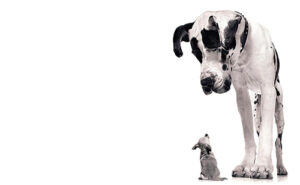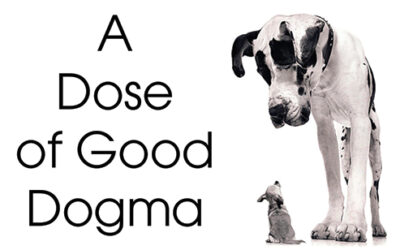R-E-S-P-E-C-T
You know when your kids have a babysitter or are staying with your friends, and they tell you how well behaved and cooperative your kids are, but you can’t understand why they’re saying that? Well, I’ve found that the same is true with dogs.
I have an activity in my classes that involves passing your dog to several different people. I do this for a couple reasons. First, it’s important that your dog (especially if shy or under socialized) be exposed to strangers who will pet them and give them treats. Second, you want your dog to be comfortable being handled by as many people as possible, so that going to the vet or groomer might be a less traumatic experience. It turns out that most dogs, when engaged with someone else will respond quite efficiently to commands, with no problem, causing much shock and awe to the owners.
I use the analogy of children because people can relate to it. I mention the class activity because what I see in class is often the dog’s lack of cooperation with the owner, but quite a good response with another person. This brings me to the crux of this article — does your dog respect you? Clearly, if your dog is not responding to you, the answer is no.
Why wouldn’t your dog respect you? Several reasons come to mind. You’re not seen as the pack leader, you’re inconsistent with commands, there are too many people trying to train and the dog is confused or your dog has access to food all day long so you become less of a provider, less important.
Respect from your dog is something that is earned by providing what your pack animal needs, a pack with a leader. Maybe more than one, if you have kids! All humans in the home should be seen as pack leaders by earning the dog’s respect. In order to earn the respect there must be rules and boundaries that keep the dog’s life structured and provide regular routines such as training time, feeding time, walk time, play time. These are activities the dog can depend on and expect. But there’s another side of the acquired status; in order to earn respect, you must show respect. Physical threats, punishment or continual yelling at your dog are not conducive to establishing trust or respect, especially if your dog has come from a shelter or rescue organization. These behaviors may frighten them away from you. Respect your dog by providing patience, exercise, positive reinforcement and fairness. You will be amazed to discover how much this mutual respect establishes a more trusting, focused, obedient canine companion. If your dog sees you, the human, as someone to be trusted and respected, the training process will flow smoother and the relationship will blossom. Of course, your dog’s temperament, stage of maturity and early socialization skills, learned from its mom and siblings, also come into play.
I try to encourage my human students to look at the big picture of life with their dog, as opposed to compartmentalizing each command or behavior when training. Everyday, all day long, is an opportunity to train, formally and informally. Exude the energy and confidence of a leader, use your voice and body to communicate with your dog. Be consistent, firm and fair, play! Spoil them but set boundaries.
Good Dogma has been training humans and their dogs since 1996. Readers are invited to submit questions to gooddogma@hotmail.com. Contact information for all offered services can be found on our website www.GoodDogma.net



